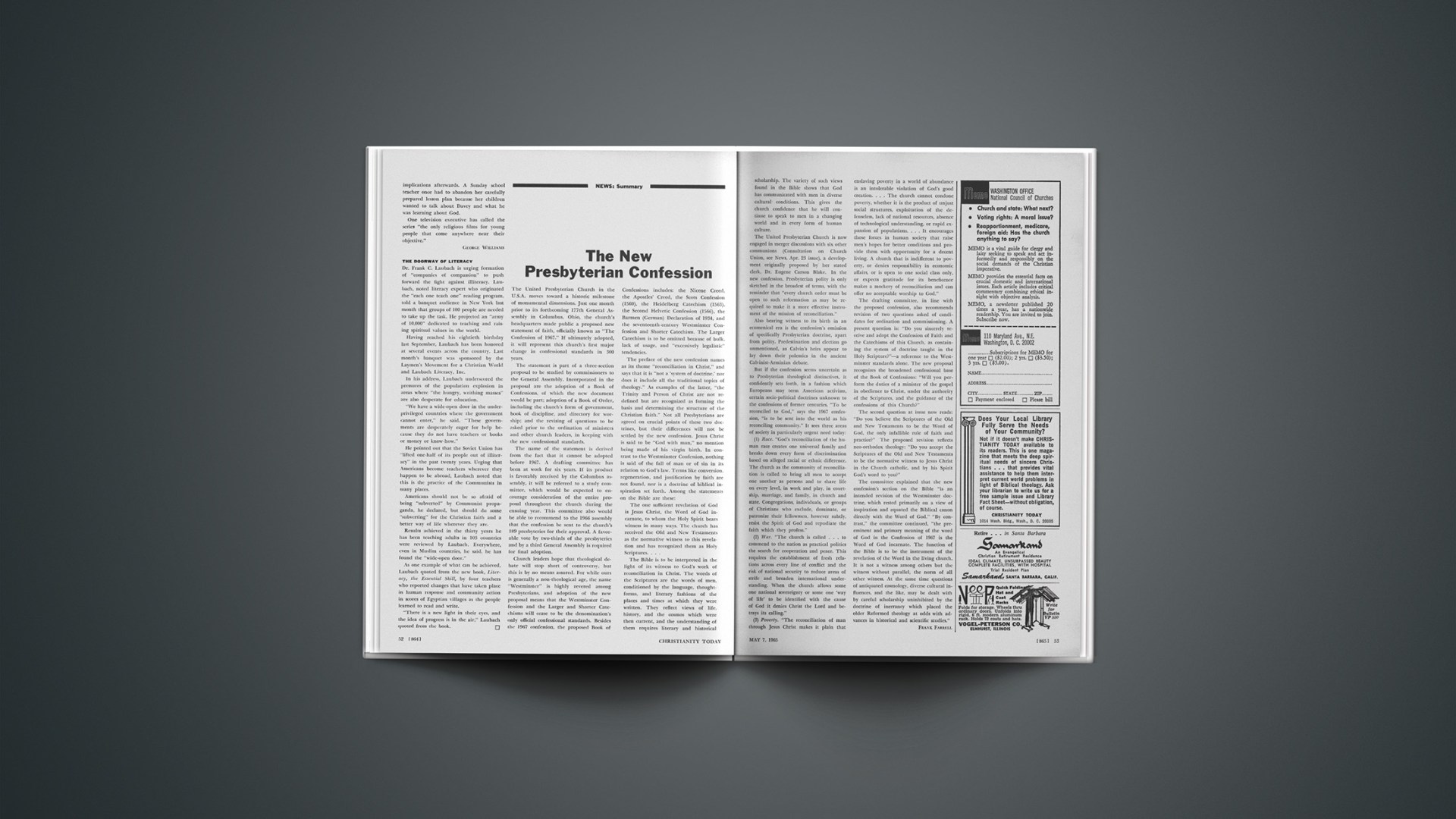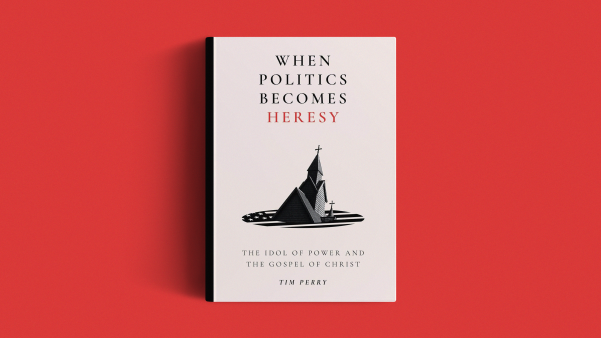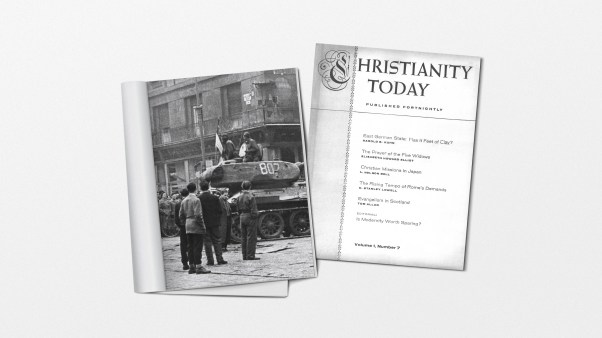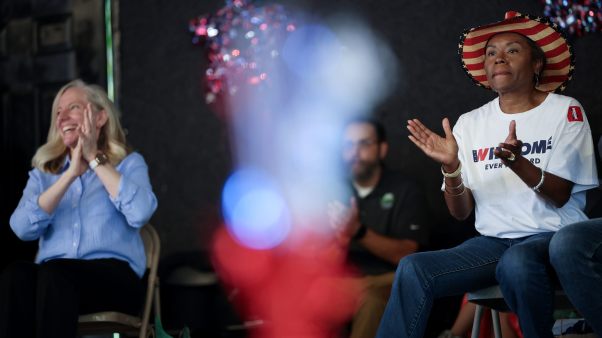The United Presbyterian Church in the U.S.A. moves toward a historic milestone of monumental dimensions. Just one month prior to its forthcoming 177th General Assembly in Columbus, Ohio, the church’s headquarters made public a proposed new statement of faith, officially known as “The Confession of 1967.” If ultimately adopted, it will represent this church’s first major change in confessional standards in 300 years.
The statement is part of a three-section proposal to be studied by commissioners to the General Assembly. Incorporated in the proposal are the adoption of a Book of Confessions, of which the new document would be part; adoption of a Book of Order, including the church’s form of government, book of discipline, and directory for worship; and the revising of questions to be asked prior to the ordination of ministers and other church leaders, in keeping with the new confessional standards.
The name of the statement is derived from the fact that it cannot be adopted before 1967. A drafting committee has been at work for six years. If its product is favorably received by the Columbus assembly, it will be referred to a study committee, which would be expected to encourage consideration of the entire proposal throughout the church during the ensuing year. This committee also would be able to recommend to the 1966 assembly that the confession be sent to the church’s 189 presbyteries for their approval. A favorable vote by two-thirds of the presbyteries and by a third General Assembly is required for final adoption.
Church leaders hope that theological debate will stop short of controversy, but this is by no means assured. For while ours is generally a non-theological age, the name “Westminster” is highly revered among Presbyterians, and adoption of the new proposal means that the Westminster Confession and the Larger and Shorter Catechisms will cease to be the denomination’s only official confessional standards. Besides the 1967 confession, the proposed Book of Confessions includes: the Nicene Creed, the Apostles’ Creed, the Scots Confession (1560), the Heidelberg Catechism (1563), the Second Helvetic Confession (1566), the Barmen (German) Declaration of 1934, and the seventeenth-century Westminster Confession and Shorter Catechism. The Larger Catechism is to be omitted because of bulk, lack of usage, and “excessively legalistic” tendencies.
The preface of the new confession names as its theme “reconciliation in Christ,” and says that it is “not a ‘system of doctrine,’ nor does it include all the traditional topics of theology.” As examples of the latter, “the Trinity and Person of Christ are not redefined but are recognized as forming the basis and determining the structure of the Christian faith.” Not all Presbyterians are agreed on crucial points of these two doctrines, but their differences will not be settled by the new confession. Jesus Christ is said to be “God with man,” no mention being made of his virgin birth. In contrast to the Westminster Confession, nothing is said of the fall of man or of sin in its relation to God’s law. Terms like conversion, regeneration, and justification by faith are not found, nor is a doctrine of biblical inspiration set forth. Among the statements on the Bible are these:
The one sufficient revelation of God is Jesus Christ, the Word of God incarnate, to whom the Holy Spirit bears witness in many ways. The church has received the Old and New Testaments as the normative witness to this revelation and has recognized them as Holy Scriptures.…
The Bible is to be interpreted in the light of its witness to God’s work of reconciliation in Christ. The words of the Scriptures are the words of men, conditioned by the language, thought-forms, and literary fashions of the places and times at which they were written. They reflect views of life, history, and the cosmos which were then current, and the understanding of them requires literary and historical scholarship. The variety of such views found in the Bible shows that God has communicated with men in diverse cultural conditions. This gives the church confidence that he will continue to speak to men in a changing world and in every form of human culture.
The United Presbyterian Church is now engaged in merger discussions with six other communions (Consultation on Church Union, see News, Apr. 23 issue), a development originally proposed by her stated clerk, Dr. Eugene Carson Blake. In the new confession, Presbyterian polity is only sketched in the broadest of terms, with the reminder that “every church order must be open to such reformation as may be required to make it a more effective instrument of the mission of reconciliation.”
Also bearing witness to its birth in an ecumenical era is the confession’s omission of specifically Presbyterian doctrine, apart from polity. Predestination and election go unmentioned, as Calvin’s heirs appear to lay down their polemics in the ancient Calvinist-Arminian debate.
But if the confession seems uncertain as to Presbyterian theological distinctives, it confidently sets forth, in a fashion which Europeans may term American activism, certain socio-political doctrines unknown to the confessions of former centuries. “To be reconciled to God,” says the 1967 confession, “is to be sent into the world as his reconciling community.” It sees three areas of society in particularly urgent need today:
(1) Race. “God’s reconciliation of the human race creates one universal family and breaks down every form of discrimination based on alleged racial or ethnic difference. The church as the community of reconciliation is called to bring all men to accept one another as persons and to share life on every level, in work and play, in courtship, marriage, and family, in church and state. Congregations, individuals, or groups of Christians who exclude, dominate, or patronize their fellowmen, however subtly, resist the Spirit of God and repudiate the faith which they profess.”
(2) War. “The church is called … to commend to the nation as practical politics the search for cooperation and peace. This requires the establishment of fresh relations across every line of conflict and the risk of national security to reduce areas of strife and broaden international understanding. When the church allows some one national sovereignty or some one ‘way of life’ to be identified with the cause of God it denies Christ the Lord and betrays its calling.”
(3) Poverty. “The reconciliation of man through Jesus Christ makes it plain that enslaving poverty in a world of abundance is an intolerable violation of God’s good creation.… The church cannot condone poverty, whether it is the product of unjust social structures, exploitation of the defenseless, lack of national resources, absence of technological understanding, or rapid expansion of populations.… It encourages those forces in human society that raise men’s hopes for better conditions and provide them with opportunity for a decent living. A church that is indifferent to poverty, or denies responsibility in economic affairs, or is open to one social class only, or expects gratitude for its beneficence makes a mockery of reconciliation and can offer no acceptable worship to God.”
The drafting committee, in line with the proposed confession, also recommends revision of two questions asked of candidates for ordination and commissioning. A present question is: “Do you sincerely receive and adopt the Confession of Faith and the Catechisms of this Church, as containing the system of doctrine taught in the Holy Scripture?”—a reference to the Westminster standards alone. The new proposal recognizes the broadened confessional base of the Book of Confessions: “Will you perform the duties of a minister of the gospel in obedience to Christ, under the authority of the Scriptures, and the guidance of the confessions of this Church?”
The second question at issue now reads: “Do you believe the Scriptures of the Old and New Testaments to be the Word of God, the only infallible rule of faith and practice?” The proposed revision reflects neo-orthodox theology: “Do you accept the Scriptures of the Old and New Testaments to be the normative witness to Jesus Christ in the Church catholic, and by his Spirit God’s word to you?”
The committee explained that the new confession’s section on the Bible “is an intended revision of the Westminster doctrine, which rested primarily on a view of inspiration and equated the Biblical canon directly with the Word of God.” “By contrast,” the committee continued, “the preeminent and primary meaning of the word of God in the Confession of 1967 is the Word of God incarnate. The function of the Bible is to be the instrument of the revelation of the Word in the living church. It is not a witness among others but the witness without parallel, the norm of all other witness. At the same time questions of antiquated cosmology, diverse cultural influences, and the like, may be dealt with by careful scholarship uninhibited by the doctrine of inerrancy which placed the older Reformed theology at odds with advances in historical and scientific studies.”
Protestant Panorama
Southern Baptists report that more than 70 per cent of their junior and senior colleges have indicated compliance with the Civil Rights Act of 1964, a stipulation for receiving federal loans. Colleges must sign an agreement barring racial discrimination to be eligible for financial assistance from Washington.
Disciples of Christ missionaries in Venezuela plan to continue for another two years a cooperative experiment with the Pentecostal Venezuelan Union. With help from the American Disciples, the union hopes to construct at least twenty church buildings and a school for 500 students.
Anglican and Methodist officials in the West Indies are scheduled to meet late this month to seek a basis for unity talks. The meeting will be held in Kingston, Jamaica.
Miscellany
An increasing number of Americans, especially Protestants, feel that religion as a whole is losing its influence, according to Gallup surveys. “The view that religion’s impact on American society is weakening is much more a Protestant than a Catholic viewpoint,” says pollster George Gallup. “In fact, a considerably greater proportion of Catholics think religion is increasing its influence (46 per cent) than hold that religion is losing ground (28 per cent).”
Some 11,000 Rexall druggists across America this month begin a national youth program to be built around the theme, “Let’s Change the Headlines from Juvenile Delinquency to Juvenile Decency.” The program will feature an essay contest in which teen-agers are to express their views on their responsibilities in American life.
Intruders set fire to a Baptist church in Montreal, causing damage estimated at $3,000. On a wall they left a misspelled message in French, “Vous L’Aves Voulus” (“You asked for it”). Hymnbooks were found strewn in neighboring backyards. The incident coincided with the first anniversary of the church, a converted synagogue in a thickly populated area.
Personalia
Samuel J. Patterson, 64-year-old layman from San Antonio, was elected moderator of the General Assembly of the Presbyterian Church in the U. S.
Dr. Gerhard Ebeling was appointed professor of systematic theology at the University of Tübingen, Germany.
The Rev. Harry H. Meiners, Jr., was named first stated clerk of the newly merged Reformed Presbyterian Church, Evangelical Synod.
The Rev. Peter Nieuwkoop was chosen director of Christian Witness to Jews, Inc., succeeding the Rev. Vernel Shannon, who resigned last October.
Dr. L. Nelson Bell, executive editor of CHRISTIANITY TODAY and author of the column, “A Layman and His Faith,” threw out the first ball last month as the Asheville (North Carolina) Tourists opened their season with an 8–3 win over the Charlotte Hornets of the Southern League. Before his retirement ten years ago, Dr. Bell practiced surgery in Asheville. In the aftermath of a remarkable recovery from surgery and a third coronary attack, he continues his heavy schedule of speaking, writing, and committee duties.










